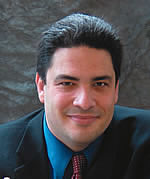|
Issue Contents :: Inside Oberlin
Stamped by Magnificence
Letter from the Conservatory Dean David Stull
 As
we conclude another remarkable semester, it is worth noting a review
by Donald Rosenberg of the Cleveland Plain Dealer of
one of the most extraordinary events in Oberlin's recent history:
"...virtually everything about (the performance of Mahler's Fourth
Symphony)
was stamped by magnificence. The Oberlin students no doubt drew much
inspiration from Mahler, but they also had a mesmerizer on the podium,
Sir Simon Rattle, music director of the Berlin Philharmonic." As
we conclude another remarkable semester, it is worth noting a review
by Donald Rosenberg of the Cleveland Plain Dealer of
one of the most extraordinary events in Oberlin's recent history:
"...virtually everything about (the performance of Mahler's Fourth
Symphony)
was stamped by magnificence. The Oberlin students no doubt drew much
inspiration from Mahler, but they also had a mesmerizer on the podium,
Sir Simon Rattle, music director of the Berlin Philharmonic."
It is difficult to improve on Mr. Rosenberg's assessment of
the Oberlin Chamber Orchestra's performance under the brilliant
baton of Maestro Rattle, but I would add that it was not only a tremendous
achievement by our students and faculty, but emblematic of the great
level of energy and enthusiasm that defines the Conservatory of Music
as it moves forth in the 21st century.
This year marks our 140th anniversary as the oldest, continuously
operating Conservatory of Music in the country, and it is indeed
worthy of celebration. Oberlin graduates have long populated the
major orchestras and opera companies of the world, but perhaps it
is less known that it has also generated many of the great teachers
and advocates for music in our communities. A quick examination of
the major conservatories, community music schools, public music programs,
and leading artist management firms finds them replete with members
of the Oberlin family. While it is true that a few artists, such
as Itzhak Perlman, Midori, and Gil Shaham did not have the benefit
of attending Oberlin, indeed their teacher did. These artists have
performed with our alumni and good friends of the Cleveland Orchestra,
an organization whose founding trustee was Oberlin graduate John
Long Severance. In addition, within the fields of business, banking,
education, medicine, law and many others, we have powerful advocates
of serious music who are proud graduates from one or both divisions
of this remarkable institution.
I don't mention these accomplishments simply to brandish our
success, but to remind ourselves of the depth and scope of our contribution
to the world, the historical importance of our values, and the significant
responsibility we have in shaping the future. In my welcoming remarks
to the entering class of students last fall, I illustrated this point
by quoting a section from the 1944 Oberlin Catalog entitled "The
Study of Music in the Time of War,"which says "...Oberlin
is aware that sooner or later the war will end; that the peoples
of the earth must start anew to build an enduring society of neighborly
humanity; that in the new society, the arts, including music, will
surely hold a significant role. To live worthily, and to lead effectively
in the peace that will follow the war, this generation will need
college and professional training more than any generation needed
it before."
In looking toward our future, which is indeed exciting, challenging,
and complex, we should remember the remarkable achievements and core
values that have defined Oberlin and will continue to underpin
our journey as a unique and vitally important institution committed
to continuing academic and artistic excellence in the coming century.
On behalf of our students and faculty, I thank all of you for your
current and future support. It is an honor and privilege to serve
as Dean of the Oberlin Conservatory of Music.
David H. Stull '89
Dean, Oberlin Conservatory of Music
Correction: A condensed version of this letter appears
in the printed issue of the Winter 2004-05 Oberlin Alumni Magazine
Due to the editor's
error, that version mistakenly implies that alumnus John Long Severance
was the teacher of artists Itzhak Perlman, Midori, and Gil Shaham. OAM apologizes
for the error.
|





